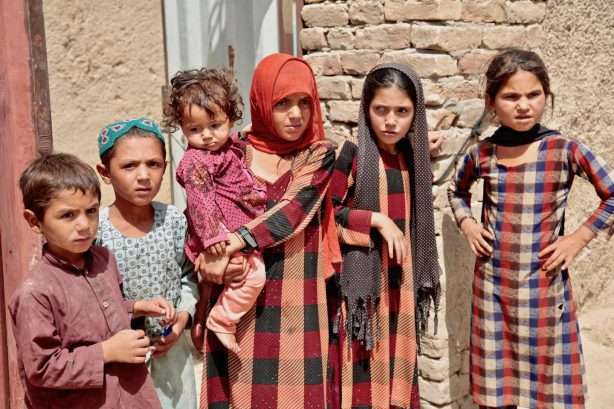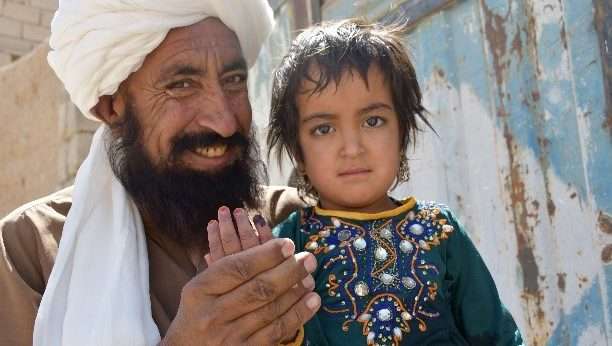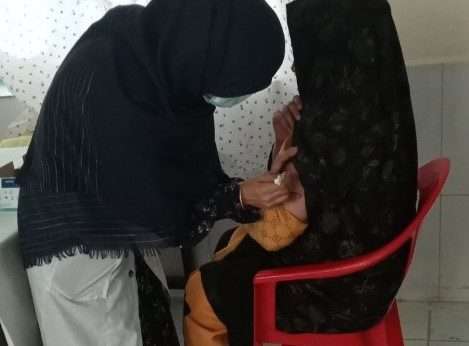Afghan Women Determined to End Polio

KANDAHAR, Afghanistan – October 2020. In a smoky village in Dund District, Kandahar, southern Afghanistan, 11 month old Subhania sits in the corner of her home, watching her friends play in the scorching heat. Subhania wants to join her friends but each time she tries to stand, she falls. Her legs are paralyzed; she cannot walk.
Until recently, Subhania was dashing around the house, like any other toddler. Suddenly, she fell ill with a high fever and diarrhea. A trip to a hospital in Kandahar city confirmed she had contracted polio.
“I should have let them vaccinate the baby,” regrets her father, Gul Muhammad, who lost his first-born child, Zoheira, to an unknown illness at the same age. “Every time the vaccinators knocked at my door, I sent them away. Now my little girl is paralyzed by polio. When, I look at her, I feel pain; her future is ruined.”
Kandahar province is one of the hot spots for polio virus in the country. The communities are gripped by security fears, deep poverty and stifling tradition. The polio crisis is exacerbated by a group of families who refuse to vaccinate their children, despite interventions by health workers. They hold deep superstitions and are influenced by rumours and misinformed religious beliefs about the polio vaccine.

News quickly spread in the neighborhood about Subhania’s paralysis. Hayatullah, a renowned vaccine rejector panicked. His 5 month old son, Bilal, had never been vaccinated.
“I was terrified, I couldn’t sleep that night thinking of my son,” said Hayatullah. “I thought I was going to wake up in the morning and find him paralyzed,” he explained.
The following day, Bilal was vaccinated at the local clinic. Countless other parents, also desperately worried, vaccinated their children in a case response campaign in the district.
“It’s very difficult to convince families who refuse the polio vaccine,” says Asadullah, the social mobiliser, who has worked in the area for three years. “We just continue with our work, hoping one day, they will realize the importance of the vaccination.”
Situations like these make a sustained vaccination campaign challenging. To date, there are 53 confirmed Wild Poliovirus (WPV) cases in the country. Last year, that number was 29. The increase of cases occurred after the COVID-19 pandemic that disrupted polio campaigns and created an immunity gap.

Women’s Efforts to End Polio
Afghanistan remains one of two endemic countries, with Pakistan, battling to end polio. And although Afghanistan’s routine immunization rates are among the lowest in the world, a new group of women, known as Female Mobiliser Vaccinators (FMVs), recruited by the UNICEF polio programme, and placed in strategic health facilities, are determined to change that trajectory.
At the Mirwais Regional Hospital in Kandahar city, a large crowd of mothers queue for routine immunization services. A female FMV is educating mothers on the importance of healthcare for young children.
The Female Mobiliser Vaccinators’ messages spread far and wide; that’s how Fahiya learned about the importance of vaccinations.
“I couldn’t wait and lose another child,” says Fahiya, who lost her first baby because she was not vaccinated. “My husband does not want us to vaccinate our children. Today, I waited for him to go work and secretly brought our child here to be immunized.”
“Men are the biggest obstacle to immunization in Afghanistan,” says Zainep, the Nurse in charge at the delivery ward at Mirwais Regional Hospital. “But a lot has improved since the FMVs were posted here. Mothers have learned the benefits of immunization and spread them to the villages. Now, we receive about 180 to 200 mothers every day. Most children are vaccinated in secret.”
The hospital has a maternity ward where about 80-100 babies are born every day. These mothers are sensitized by FMVs on polio and other childhood preventable diseases.
“We persuade mothers to vaccinate against polio for all newborns before they leave the ward,” says Fahima, the FMV at Mirwais hospital. “We also distribute baby blankets and hygiene kits to build trust.”
UNICEF’s polio programme is also increasing the number of female frontline workers, since women are more likely to be allowed to enter in the homes and vaccinate children; men are culturally barred.
“We have to strengthen our routine immunization coverage to end polio and other preventable disease,” said Dr. Abdul Quayum Pokhla, the director of the Regional Emergency Operation Centre for polioin Kandahar. “We appreciate the efforts of all frontline workers, but the responsibility of ending polio lies with everyone.”
More than 10 million under five children in Afghanistan remain vulnerable to the ravages of polio. It is their right to live a full and healthy life. UNICEF is committed to realizing that for every child.
Polio Update

